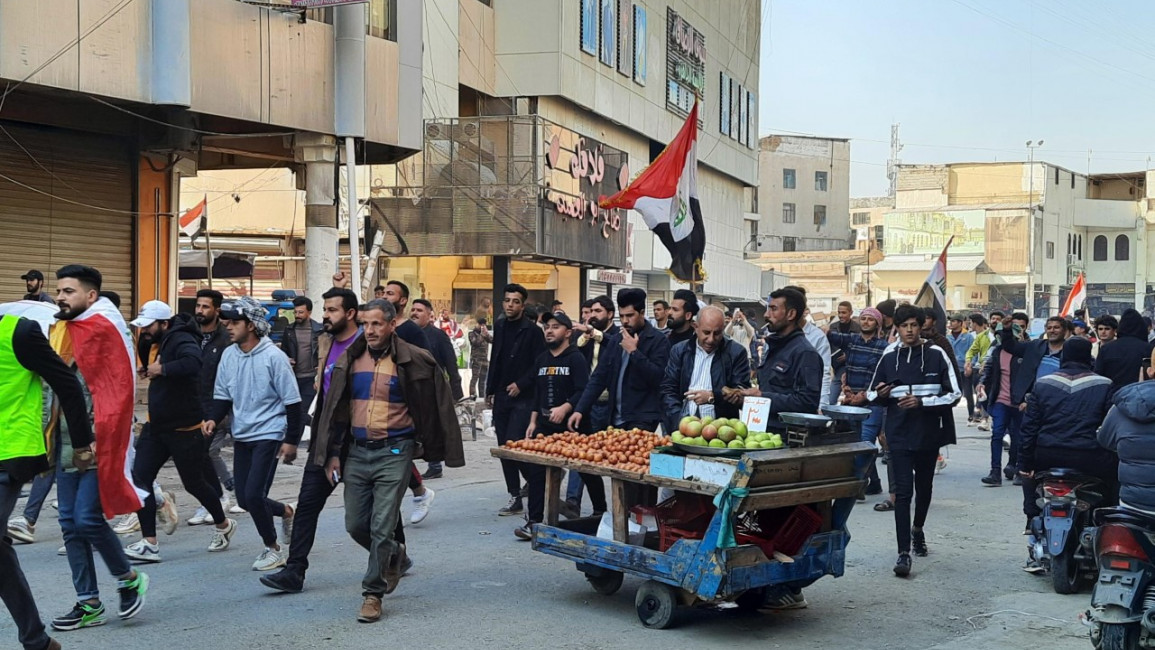Iraqis face uncertainty as Iraqi dinar drops to historic low against dollar
The Iraqi dinar on Thursday experienced its worst drop in value not seen in decades as the Iraqi authorities struggle to stop or limit the outflow of the hard currency from the country.
The value of the Iraqi dinar versus the US dollar hit a new historic low on Thursday, as the United States government restricted Iraq's access to its dollars because the Iraqi authorities have reportedly failed to stop the smuggling of the hard currency to neighbouring countries.
The exchange rate for the Iraqi dinar hit 1,750 to the dollar at the black currency market, compared to the official rate of 1,460 dinars.
Bombshell audio leaks coming out of Baghdad exposing corruption at Iraq’s Central Bank: $8 BILLION diverted to Iran-backed militias, among other crimes. Acting CBI head Ali Al Allaq is coming to DC next week—US officials should demand answers for why Iraqi $ went to Iran. 1/4 https://t.co/HLMn2DbXCQ
— Joel Rayburn (@joel_rayburn) February 1, 2023
The sharp drop in the dinar's value set off a recession in the local markets, while prices of every basic goods have soared daily.
"The rise in the rate of the US dollar in exchange for dinar made the prices of everything skyrocket by more than 25 per cent. A can of infant milk was 18 dinars, I am now purchasing it for 25 dinars. 5,000 dinars have been added to the price of rice and other basic foodstuffs," Rebeen Mohammed Aziz, a taxi driver in Sulaimaniyah city, said to The New Arab.
"The devaluation of the dinar also created an unprecedented recession in the markets. If the situation continues in this way, the conditions in Iraq become worse than in Iran," he remarked.
For his part, an owner of a famous Kebab in the city told TNA that the recession crippled the purchasing power of people, impacting his business significantly.
Iraq, the second-largest crude oil producer in OPEC after Saudi Arabia, mainly depends on income from selling oil in US dollars. The Central Bank of Iraq then sells the US dollar, as well as other foreign currencies, during daily auctions.
However, private banks and currency market companies - mostly owned by the ruling parties and tycoons - have been funnelling the dollar to Iran and other neighbouring countries, including Turkey, Syria and Lebanon, which have also been experiencing their respective currency crises.
Iraq's premier, Mohammed Shia al-Sudani, said Tuesday that new banking regulations revealed fraudulent dollar transactions made from Iraq, as the fresh controls coincide with a drop in the local currency's value.
The United States sanctioned several Iraqi banks dealing mainly with Iran. Late last year, the US Federal Reserve began taking measures on transactions to slow the flow of dollars into Iraq.
"The recession caused by the dinar-dollar exchange rate has hit nearly 80 per cent of our marketing. We purchase clothes in Turkey with dollars and sell them for dinars. We sometimes make big losses due to the fluctuations in the currency markets," Rawa Dara, owner of Pellini brand clothes in Sulaimaniyah's Salim Street, said to TNA.
"People, in general, are suffering from the consequences of Iraq's economic recession. I think the reasons behind the dinar losing its value against the dollar is political and the smuggling of dollars to Iran," Dara added.
Ali Hama Salih, a Kurdish lawmaker in the Kurdistan parliament, posted today on his Facebook page that on Wednesday nearly US$80 million were funnelled from the Kurdistan region's three provinces to three countries under the name of wire transfers.
The MP did not go as far as to name those counties, but recently he said more than US$69 million are being wire transferred from Erbil and Sulaimaniyah to Turkey.
Salih further cautioned that if the authorities do not quickly take urgent measures, "a catastrophe" will befall the country.
People across the country are predicting the dinar's value to reach a new drop of 2,000 per 1 dollar.
On Tuesday, the Central Bank of Iraq sold only US$69 million via currency auctions.
Last week, hundreds of people demonstrated in front of Iraq's central bank headquarters in Baghdad to demand the Iraqi government end the dinar's decline.
Fresh demonstrations are planned for Friday as the one-week deadline for lowering the dollar rate per dinar has passed but Iraqi and Kurdish authorities have failed to stop the dinar from constantly losing its value.
ICB in December 2020 devalued the dinar, setting the exchange rate at 1,460 dinars per dollar amid an economic crisis caused by low oil prices and the Covid-19 crisis. Previously, the dollar was traded at 1,182 Iraqi dinars.
Foreign Minister Fuad Hussein and the new central bank chief, Ali al-Allaq, will be among a delegation travelling to Washington on February 7 to discuss the new mechanism and the fluctuating exchange rate.


![The White House Correspondents' dinner is seeing renewed scrutiny amid Israel's war in Gaza. [Brooke Anderson/The New Arab]](/sites/default/files/styles/image_212x120/public/2024-04/IMG_5497.jpg?h=71976bb4&itok=TX4OspBM)